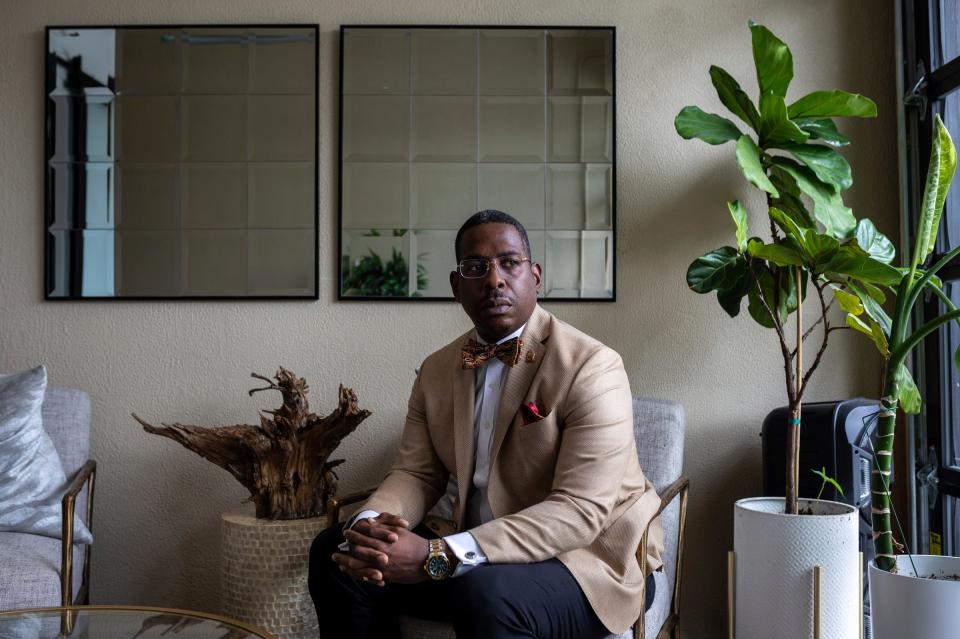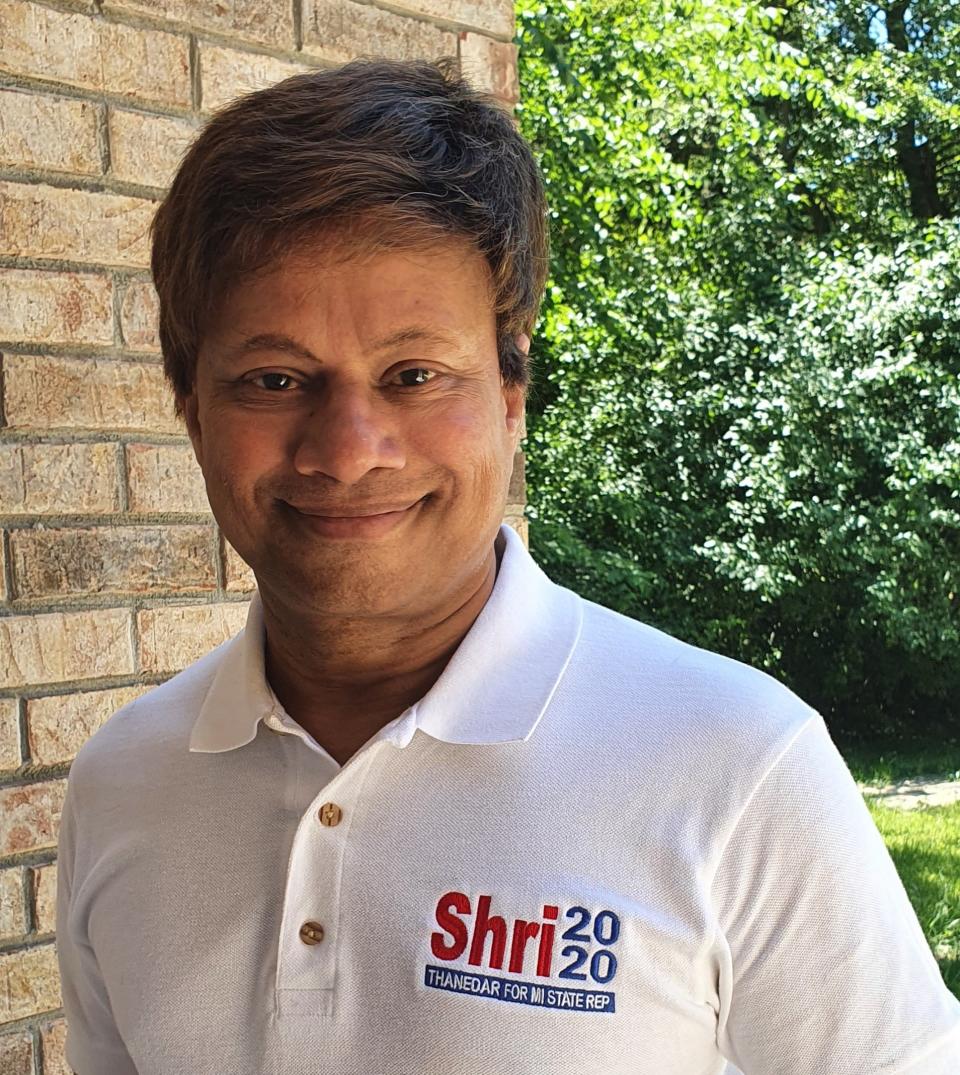Meet the man behind the fraudulent scheme threatening Adam Hollier's congressional campaign
- Oops!Something went wrong.Please try again later.
- Oops!Something went wrong.Please try again later.
- Oops!Something went wrong.Please try again later.
Of all Londell Thomas' sins, the worst may be the text he sent Charles Longstreet II on April 14.
Thomas is the main suspect in the implosion of Adam Hollier's bid to win the Democratic nomination to run for Congress in metro Detroit's 13th District.
Longstreet is a Detroit attorney who paid Thomas thousands of dollars to help him collect thousands of signatures to qualify as a candidate for one of the most precious things in Wayne County politics: an open seat on the Circuit Court bench.

Longstreet sent Thomas a text at 4:26 p.m. on April 14 that said he planned to turn in petitions and file his candidacy papers on April 18, "because that is the date of my father's death last year."
"It will be done and approved then," Thomas replied. "We honoring your father that day."
What happened next was a grotesque betrayal that should send a shiver down the spine of anyone who hired Thomas to help them qualify to run for office in Michigan, where many candidates have to turn in petitions signed by registered voters. Some candidates use political consultants to help gather signatures, especially for statewide offices like governor or U.S. Senator which require 15,000 signatures. Most candidates turn in many more, because there are always duplicate signatures, signers who aren't registered voters and errors by petition circulators that can disqualify entire pages of signatures.
Longstreet, whose father worked with his hands and who taught him the value of hard work, collected most of the signatures he needed by relying on family and friends.
"It is hard getting those signatures," he told me last week. "You'd be out there for hours and hours and hours and hours. Sometimes you're good, sometimes you're getting cussed out."
So, he hired Thomas to help get endorsements, collect 2,000 more petition signatures and for a task that upon reflection would be funny if it wasn't so damn sad: To validate the petition signatures Longstreet and his volunteer crew collected.
In late March, Thomas told Longstreet he had collected 542 signatures. A week later, he said he had 1,326 signatures. In early April, he told Longstreet 26.7% of the signatures Longstreet and his volunteers had collected were not valid.
"We definitely need 500," Longstreet texted Thomas.
"I agree," Thomas replied. "I definitely think 500 more."
Longstreet continued to collect signatures, but because his law practice requires him to shuttle between Detroit and Flint, he relied on Thomas to get the bulk of the petitions that would put him over the top and well clear of the 4,000 valid signatures he needed to get on the ballot. Every time Thomas suggested they get more signatures, he also increased his fee. He charged Longstreet $1,500 to get an additional 250 signatures that Longstreet was sure would put him in the safety zone.
Longstreet and his wife drove to Lansing on April 18 — the day Longstreet chose to honor his father — and noticed something odd when state board of elections workers got through the petitions he brought and started reviewing Thomas' pile.
"He had Hill Harper's petitions," Longstreet said, "and he mixed them in with my petitions."
Longstreet said Thomas claimed he grabbed the wrong stack — Harper is running in the Democratic primary for U.S. Senate — and would come back the next day with the petitions he collected for Longstreet.
Suspicious, Longstreet called Thomas on April 19 and asked when he was heading back to Lansing with the petitions that would put him over the top. He planned to go, too. Just to be sure. But he said Thomas told him: "I'm on my way, bro."
Later that day, he said Thomas told him: "Man, the eagle has landed. I filed your petitions. … Let's get ready for August."
Thomas was referring to the Aug. 6 primary.
But Longstreet won't run in that race. He never even made it to the starting line.
The bad news followed the text Thomas sent him at 9:28 a.m. on April 24 — the day after the filing deadline. It simply said: "Urgent. Pls call"
Longstreet said Thomas told him he did not have enough valid petition signatures to qualify for the ballot. Devastated, Longstreet began making inquiries. He ended up very unhappy with what he got for the $15,950 he said he paid Thomas.
"He turned in 120 pages of toilet paper," Longstreet told me.
Today, Longstreet isn't the only politician sorry they worked with Thomas.
Wayne County election officials found that Hollier had so many fraudulent or defective petitions that he that didn't have enough valid signatures to challenge U.S. Rep. Shri Thandar. Thomas turned in the bulk of those petitions. Ironically, Thomas challenged the validity of petitions Nasser Beydoun and U.S. Rep. Elissa Slotkin filed to compete in the Democratic primary for the U.S. Senate seat being vacated by the retirement of Debbie Stabenow. Both challenges are farcical, because Thomas only challenged a couple hundred of the more than 15,000 signatures each candidate submitted. But because Thomas signed the challenges as an "Agent of Harper campaign," he has raised questions about any work he did for Harper — including how many signatures he collected for the actor-turned-politician.

Whatever Hollier decides to do next, his reputation has taken a hit, his campaign squandered precious time and resources defending bogus petitions, and prominent Democrats who took the unusual step of endorsing him in an intra-party fight with a sitting congressman must be regretting their decision to back a candidate who started the race with his shoes on the wrong feet. One reason is the possibility — make that the near certainty — that election deniers will use Michigan Secretary of State Jocelyn Benson's endorsement of a candidate who filed fraudulent petitions as fresh fuel for their unfounded claims Michigan election officials can't be trusted.
That may not be the only headache heading Benson's way. But before we take this show on the road to Lansing, let's get back to Thomas, whose rapid rise in politics is heading for the same sort of landing that finished off the Hindenburg.
Oh, the humanity!
As a criminal defense attorney, Longstreet has met more than a few hustlers. So, he checked Thomas out before forking over some of his hard-earned cash.
The feedback was all good, which is why many are shocked at how things went so wrong.
Thomas first appeared in the Free Press back in May 2002, when he was 18 years old and working with the Youth Initiatives Project of the Neighborhood Service Organization. He was quoted in a story about students speaking out against gun violence.
Later that month, he had a column published in the Free Press urging Detroit's leaders to listen to young people for solutions to gun violence. It began: "What has the world come to when a 9-year-old can explain how to use an AK-47 or MAC10? A boy I know in Detroit can." The Youth Initiatives Project asked for a meeting with then-Mayor Kwame Kilpatrick and organized a march and rally at Belle Isle to stop gun violence. Thomas, a freshman at Wayne State University, ended his column: "The leadership in the city has failed us, and young people are deciding to step up."
Thomas did not respond to my repeated requests for an interview, but he did contact an attorney. No one I spoke to foresaw this change in fortune. Thomas graduated from young advocate to legislative and political operative. After a spell on then-City Council President Ken Cockrel Jr.'s staff, he became deputy director of the Detroit Neighborhood City Halls in 2009 after Cockrel became mayor.
In 2013, he worked on Mike Duggan's write-in campaign for mayor of Detroit. Campaign finance records show he was paid more than $40,000 as a consultant and campaign staffer. Brian Barnhill, who ran the Duggan campaign, said Thomas worked on Barack Obama's presidential campaign and became Duggan's field director. He said Thomas had no involvement with the mishap that got Duggan knocked off the ballot for turning in his paperwork early.
A profile on Netroots Nation, a nonprofit that works with progressive activists, said Thomas worked for the Michigan Democratic Party, the Center for Popular Democracy, the Michigan League of Conservation Voters and on a campaign for U.S. Sen. Tammy Duckworth of Illinois. In 2017, Thomas was listed as an employee of the Service Employees International Union while protesting outside then-U.S. Rep. David Trott's office in Troy.
Political consultant Skip Mongo told me: "Everything I've ever known about Londell is straight-up."
Branden Snyder, executive director of Detroit Action, said Thomas served as a volunteer board member for the progressive organization from 2018 to 2023.
"All the work that he's done for us has been above board and with utmost integrity," Snyder said.
Court records from 2018 and 2019 indicate Thomas had financial troubles. Around 2021, he opened his own political consulting firm, Groundmind Strategies. The firm's website says: "Our team is proud to have 20 years of directing successful voter contact and strategy engagement for municipal, statewide and presidential elections."
That record is now tarnished by the bogus petitions Thomas turned in for Hollier. Hollier disowned nine of those pages — supplemental petitions Thomas turned in to provide Hollier a cushion if problems cropped up with other signatures. The pages were so loaded with forged names and signatures they instead set off a flare for anyone looking for problems. Thanedar, facing a tough challenge from Hollier, cited those petitions and other alleged problems ranging from hundreds of unregistered voters, to scores of duplicate signatures, to dozens of forged signatures, in his bid to keep Hollier out of the race.
Before Wayne County election workers voided hundreds of Hollier's signatures, I spotted at least one forgery and two sets of duplicate signatures: My wife, Free Press criminal justice reporter Tresa Baldas, didn't sign Hollier's petitions, yet her name appears twice.
The more surprising duplicate involves Thomas. Somehow the petition verification expert didn't notice that he signed Hollier's petitions twice — on the same day! At least Thomas' signature appears to be genuine. Unfortunately for Hollier, duplicate signatures cancel each other out. So, neither of the signatures Thomas inked on April 13 will count.
Beydoun said he was puzzled by the challenge Thomas filed to his petitions to run in the Democratic U.S. Senate primary because Thomas flagged less than 200 signatures of the more than 24,000 Beydoun says he turned in. Even if every challenge was legit, that would leave Beydoun with about 9,000 signatures to spare.
Beydoun faulted Harper for hiring Thomas.
"If you're running for office and you're trying to be a different type of politician, don't go low," Beydoun said.
Slotkin's campaign declined to comment on Thomas' challenge of her petitions, but their legal response spoke loudly. Slotkin attorney Christopher Trebilcock notified state election officials who might not have been keeping up with the news out of Detroit that Thomas has been accused of fraud. He not only pointed out that Thomas circulated 66 petition pages for Harper, he shared some of the page numbers.
A Harper spokesman did not respond to my request for comment, but I imagine it would have included the word "Ouch."
Problems for politicians
One problem Hollier hasn't had is getting prominent Democrats to endorse his challenge to Thanedar.
It's unusual to see politicians get involved in a primary involving an incumbent, but Thanedar is not your typical incumbent. For starters, he is a native of India representing a predominantly Black congressional district. Hollier, a former state senator from Detroit, nearly beat Thanedar in a crowded Democratic primary when they ran to replace retiring U.S. Rep. Brenda Lawrence in 2022. Thanedar, who pumped millions of his own money into the race, easily beat the Republican in the general election.
Benson was one of many top Democrats to back Hollier shortly after he announced he would take on Thanedar again. Election officials are typically reluctant to endorse candidates, especially when they may be involved in resolving election disputes.
Now, with Hollier's campaign in jeopardy, Benson finds herself in danger of getting caught up in the controversy. State law says that if a county clerk determines a candidate does not have enough signatures, they can ask the Secretary of State to review the ruling.
I asked Secretary of State spokeswoman Angela Benander whether Benson would comment on her decision to endorse Hollier, as well as whether she now has any regrets.
Benander, a state employee who can't comment on political matters, sent me a statement that said the Bureau of Elections has "a clear track record of applying the law fairly and meticulously when evaluating all allegations of any type of fraud in the signature gathering or petition process."
Here's what else is clear to me: Benson doesn't want to talk about it.
That's unfortunate, because her decision in 2023 to hire Heaster Wheeler as a senior adviser could be another decision critics will use to challenge her impartiality. Wheeler had been Benson's assistant secretary of state until he left to help run Hollier's failed 2022 congressional campaign. Benson made no mention of Wheeler's role in Hollier's campaign when she announced last year that he was rejoining her staff.
If Hollier wants to repay Benson's kindness — and spare her a spot on the hot seat — he could skip taking his case to Lansing and head straight to Wayne County Circuit Court.
If that happens, he might run into Thomas.
That's because while Longstreet won't be on the bench, he is on the warpath.
"At this point, I know I'm out of 15 grand," he told me. "I'm not getting 15 grand back. All I can do is prosecute."

M.L. Elrick is a Pulitzer Prize- and Emmy Award-winning investigative reporter and host of the ML's Soul of Detroit podcast. Contact him at mlelrick@freepress.com or follow him on X at @elrick, Faceook at ML Elrick and Instagram at ml_elrick.
This article originally appeared on Detroit Free Press: Londell Thomas' role in petition fiasco could ruin political careers

